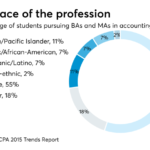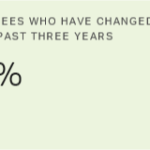By Katy Tynan
This article previously appeared on Exhale Lifestyle.
When you first enter the working world, the hardest thing to do is earn experience that matters and validate your resume. You get your college degree, create a shiny resume that spins your three summers as a lifeguard into a solid “waterfront safety specialist,” and then you start applying for jobs.
You likely get a lot of auto-responses that read something like, “Thanks, but no thanks.”
Here’s the enduring question: How can you get experience if no one will hire you?
For some, a few months of rejection letters translates into a boomerang back to graduate school. A few more years studying, a few thousand more dollars in debt, and it’s back to the job market again to see if earned abbreviations after your name help any in landing a job and launching a career.
I’ve just described the early-life credential crisis. Unfortunately, there’s another one waiting for you when you reach your 40s.
If you were lucky enough to find work after college in your field, and you translated that work into a pretty successful decade or ywo of progressively responsible jobs, congratulations. You made it through that first rough patch.
But, for most of us, sooner or later something happens. You run out of work. You may get laid off. You may hate your boss and feel like it’s time to find something better. You may want to transition from corporate to contract life. So, you dust off that resume, update it with your new and improved job titles, and start responding to job postings.
And, then you hear nothing back.
It’s like the black hole of resumes has swallowed up all your applications. A month goes by, then two, and not a single one of your artfully crafted cover letters receives a response.
You start to wonder whether you should have gotten your master’s degree. Maybe you’re not getting a call back because everyone else has more credentials than you have?

I’m diagnosing you: You have FOMC (Fear of Missing Credentials).
It’s truly tempting to believe that getting another degree will help you get a job. In fact, it’s a smart idea to stay on top of a continuous development process throughout your career, including going to conferences, getting industry certifications if that makes sense, attending webinars, and reading articles online. It’s also smart to pursue a larger credential such as a master’s degree — if you have the ability to do so while working full time and doing all the other things you need to do with your life.
But, for many mid-career professionals, this just hasn’t been an option. If you’re asking yourself the credential question because you’re not getting a response to either a job search, or to finding opportunities as a freelancer, it’s time to step back and do a little research.
Talk to a career coach.
You might need a degree to get to the next level, and you might not. But, before you go sink yourself into a thousands-of-dollars commitment, you should talk to an expert who can advise you as to whether your resume is up to snuff and help you find out what other candidates in your field have for credentials.
Schedule informational interviews
Find a few people you know personally or who are in your network on LinkedIn. Schedule some coffees and lunches, and find out what people in your ideal career are doing for professional development. Connect with some folks in human resources, and ask them to take a quick look at your background and provide feedback.
Take an online course
There are literally thousands of courses online, some free, some offered for a relatively low cost. If you feel like your skills set is missing something, a quick certificate course might be a better avenue to take than a full overhaul.
Graduate schools will always be happy to take your money, and tell you that another degree is the only way to get ahead. And, I’m not saying it’s always a bad idea. But, before you convince yourself that you can’t get another gig without spending two, four or 10 years back in school, make sure you know whether it’s truly the best way to get that next job.











